Event Reports
Event report The 12th JST Workshop "Promoting Activities toward Research Integrity - Experiencing Ethics Education Using Video Materials and Considering Effective Practices" (Oct.13, Oct.19.)
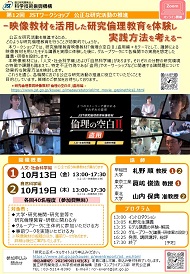
The 12th JST Workshop "Promoting Activities toward Research Integrity - Experiencing Ethics Education Using Video Materials and Considering Effective Practices" was held online on October 13 (Fri) and 19 (Thu).
In this workshop, participants used the instructional video "Gaps in Ethics 2-Plagiarism Edition"as the theme.
After experiencing lectures / model lectures by the lecturers, participants designed their lecture plan in the group work, with the assumption to implement the plan at their institutions. There are two editions of this instructional videos, "Humanities and Social Sciences Edition" and "Natural Sciences Edition". Educational methods for the problems related to plagiarism and research misconduct were discussed based on the characteristics and issues of the research environment in each field. Here is an overview of the day's activities.
Lecture
"Experiencing Ethics Education Using Video Materials and Considering Effective Practices"
by Professor Jun Fudano, Waseda University
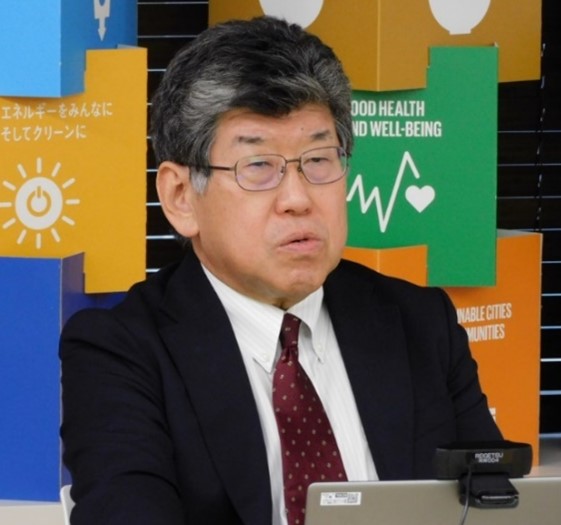
Professor Fudano's goals for this workshop were: 1) To understand and explain the purpose (learning and educational goals) and content of RCR/RECR(Responsible (and Ethical) Conduct of Research) education.
2) To suggest RCR/RECR education / training methods using the instructional video "Gaps in Ethics 2 - Plagiarism Edition"
As a recent trend, he introduced that the expression RECR (Responsible and Ethical Conduct of Research) is used by the National Science Foundation (NSF) and that it is required to conduct ethical research activities in a wider range of fields, including fair peer review, protection of information, and relationships with colleagues and students, in addition to conventional RCR. He said, "I would like you to be able to think what RECR education is and what learning and educational goals are. In addition, I would like you to be able to propose training program in research ethics education at your institution."
Next, he pointed out the recent revised points in the guidance on RCR education of the National Institute of Health (NIH). He also showed that the basic policy regarding the revision is to "reaffirm the principle that RCR education is a fundamental element of research training."
In addition, he showed that following items are listed as the definition of RECR by the National Science Foundation (NSF): The responsible and ethical conduct of research involves not only to generate and disseminate knowledge with rigor and intensity, but also a responsibility to: a. conduct peer reviews with the highest ethical standards, b. diligently protect proprietary information and intellectual property from inappropriate disclosure, and c. treat students and colleagues fairly and with respect and that RECR education is considered essential in the preparation of future scientists and engineers. He explained that this overlaps with the NIH guidance in many ways.
Then he indicated "Not only knowledge, but also ethical sensitivity, emotion, and values / attitudes toward research are stated important" in the goals of RCR education of the U.S. Office of Research Integrity (ORI)
Further, he introduced two kinds of "philosophy of education" regarding the status of research integrity education in recent years: The type that aims to comply with detailed laws and regulations (Regulation-Based), or the type that aims to cultivate ethical values and moral judgment in order to be able to act based on them (Virtue-Based). He introduced SOPs4RI (Standard Operating Procedures for Research Integrity) https://sops4ri.eu/, the results of the survey and research project in EU, as an example of overseas initiatives. He said that SOPs4RI is organized into nine categories to provide specific examples of measures in order to build and maintain an excellent research environment, so we can refer to it.
Professor Fudano summarized his lecture stating that in the future research ethics education, it is important to have element of Aspirational Ethics that leads to Good Work.
Model lecture: Professor Shunzo Majima, Tokyo Institute of Technology 《Humanities and Social Sciences Edition》
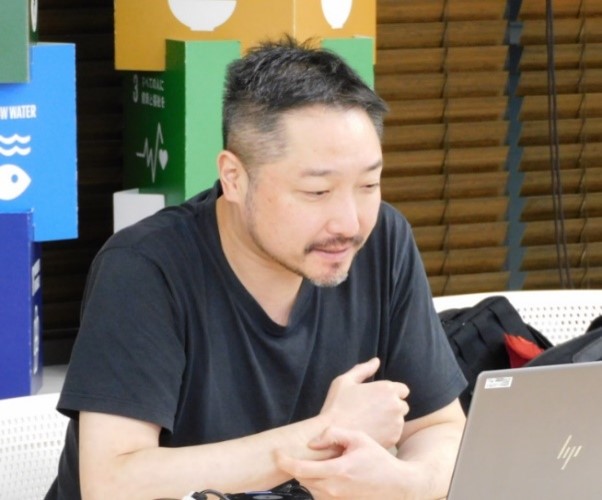
Professor Majima asked participants questions such as, "What will you do if your student commits research misconduct?" and talked about the lecture design which was intended to promote the necessity to build and maintain a good research environment, and conducting initiatives. He also said that this material can be aimed for young researchers, and training to discuss the behavior of postdocs / assistant professors can be considered.
● Model lecture: Presentation on Group Work 《Humanities and Social Sciences Edition》
In the group work, opinions of participants were mainly focused on how faculty members should provide guidance, such as the fact that even though there were many educational opportunities, Professor Kawashima was not able to provide guidance in the video. There were also many opinions that students have low awareness of the risks associated with copy and paste (plagiarism) and their research support system. A participant questioned, "Nowadays, it has become easier to copy and paste, and it is possible to use generative AI. What should be done for the education in the future?" Professor Majima replied, "You can use a plagiarism checker or let students know there is a plagiarism check when they are taking the exam."Model Lecture: Associate Professor Yasunori Yamanouchi, Tohoku University 《Natural Science Edition》
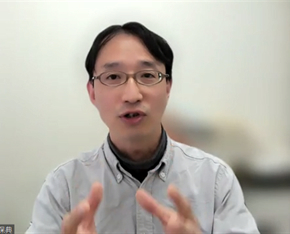
In his lecture, Associate Professor Yamanouchi referred to the responsibilities of collaborative research in the Montreal Statement at the World Conference on Research Integrity (WCRI) and said, "Research ethics education is embedded in words and actions during research activities, and human behavior will change in the context in which it is placed. It is important to create a context that makes it easy for good research to be done, and to create guidelines for how the laboratory should respond. Since you are at the forefront of research ethics education, I suggest you to look at the teaching materials at the graduate school and in the laboratory and share the response policy."
● Model lecture: Presentation on Group Work 《Natural Science Edition》
In the group work, many groups took up the "Ozawa case" (plagiarism, and roles in collaborative research). Several problems were pointed out, such as the reference was not described and that the approval of other researchers was not obtained. The rules and codes of conduct of the affiliated institution in response to this were shared, and the necessity of adding rules such as standards for plagiarism and the concrete implementation of plagiarism checks was discussed. The enhancement of the educational system at the institution was also discussed.。Group work: Considering educational goals and utilization plans
After experiencing the model lecture, educational goals / activities for lectures / training using video materials were discussed in group work, and then an educational plan was presented. For example, plans were presented such as participants are asked to investigate the relevant rules in advance, or participants conduct the program in combination with lectures on "actual cases of misconduct" and "losses related to research funds".An idea was proposed to make discussions from the standpoint of the characters. Associate Professor Yamanouchi responded to it, saying, "We need to think about whose standpoint we should look from, including the standpoint where you don't want to stand, or the standpoint of a person who acts against your intention."
Professor Majima made a comment, "If you look at the standpoint of the faculty from the standpoint of an undergraduate student, it can be considered as a negative example."
Professor Fudano highlighted the importance of setting clear and concrete learning and educational goals. He took up the presentation of the group that intended to "presents a bright outlook in academia" and said that it is important to locate it as "the education not only to prevent misconduct but also to do better research considering the reason why we develop academics."
Overall review
Professor Majima said, "In the Gaps in Ethics 2, plagiarism edition, I think several gaps between faculty members and students are demonstrated. There are points to (mutually) consider how the faculty members should behave to the students and how the students should be to the faculty members in the context of mentor-mentee relationship."Associate Professor Yamanouchi said, "In each group, an interesting plan with ingenuity were discussed. The video materials provide awareness about research ethics. A new awareness can be obtained by re-examining the video from a different perspectives by discussing it."
Professor Fudano said, "Everyone came up with an educational plan that we can put into practice right away. Training tends to focus on preventing research misconduct, however, to learn how to conduct better research also can be a goal. Through the workshop, I believe that you have noticed differences in your perspectives and in fields of expertise, so please actively participate in the research integrity community and explore ways to further promote research integrity by referring to active efforts in other countries."
In the questionnaire, we received the following comments from the participants.
- I was able to discuss with people of other research institutions and could share the practical methods and issues of research ethics education at those institutions.
- The theme of "plagiarism" is clear and easy to discuss at my own research institute.
- With regard to research ethics, we tend to feel "unpleasant feelings" in the story of misconduct prevention. I thought it is important to establish a method that we could feel positive feelings.
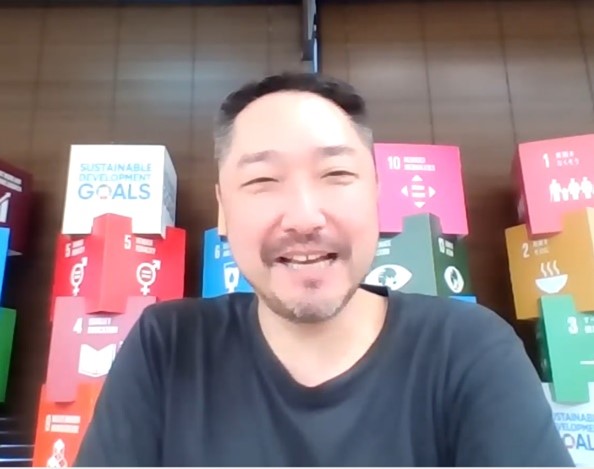
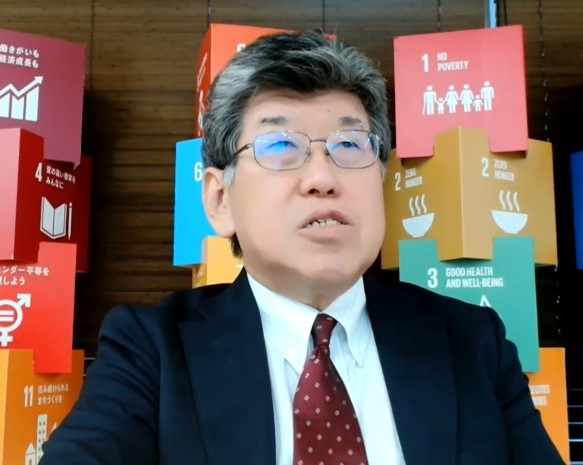
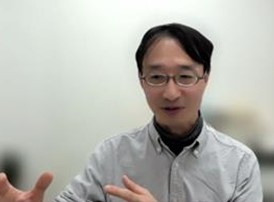
From the left, Professor Majima, Professor Fudano, and Associate Professor Yamanouchi giving lectures online
Event Report, The 11th JST Workshop

